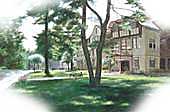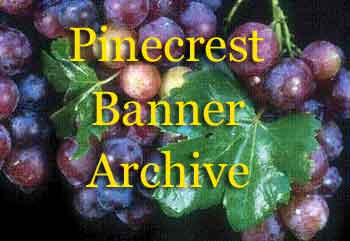Summer
1984
A Song in the Night
Walter Beuttler
Habakkuk is a book which begins with a burden and ends with
a song. In verse 1 of chapter 1 we read, “The burden
which Habakkuk the prophet did see.” The last statement
of the final chapter ends with: “. . . to the chief
singer on my stringed instruments.”
Within the context of these two extremes lies hidden a great
secret: God’s way of turning our burden into a song.
Many an experience in life begins with a burden. At the time,
we may think we will never get over it, never come out from
under it. Still, when the final note is reached, lo and behold,
it has been changed to a note of song, to a note of triumph.
The prophet Habakkuk was extremely perplexed, and in that
state of great spiritual heaviness he sensed a great burden
or weight. Something was pressing him down. There was something
he could not understand: What was God doing? And Why?
Habakkuk was full of questions: ‘O Lord, how long .
. . ?” “Why?” and “Wherefore?”
What did God have in mind in this situation? Why does He allow
such things? Do you ever ask that?
“How long shall I cry and Thou wilt not hear?”
What perplexes him here is the age-old problem of unanswered
prayer. “God, I cry but You don’t hear!”
Well, God hears but He doesn’t always answer—at
least not the way we’d like Him to.
“Why dost Thou shew me iniquity . . . ?” In other
words, “God, why do You let things go on as they do?
Why do the wicked prosper? Why don’t You DO something?”
What bothered Habakkuk here was the suffering of the righteous,
another age-old problem.
One of our first tendencies when under such heaviness is
to run to someone else for the answer. But let us see what
Habakkuk did in chapter 2, verse 1: “I will stand upon
my watch, and set me upon the tower, and will watch to see
what He will say unto me. . .” Habakkuk went to God.
He did not run to the flea market for a variety of opinions
on the problem at hand; he went to God. “And the Lord
answered . . .”
However, God’s answer did not consist of an explanation;
He gave a solution. The prophet’s questions were only
symptomatic of a deeper problem, and if the root of the problem
could be taken care of, the symptoms would disappear. God
deals with causes, not with symptoms. The Lord passed by all
of Habakkuk’s many questions and got to the root of
the cause.
So what was God’s solution? Look at Habakkuk 2:4, “.
. . the just shall live by faith.” From closer study
we can find that this verse could just as accurately be translated:
“and the just shall live by faith in His faithfulness.”
When our faith in God’s faithfulness takes hold, then
in spite of everything else, we can rest in the providence
and the wisdom of God.
God wants us to have faith that is anchored not on our understanding
of what He does, but on Who He is. There is a difference.
Our confidence should rest on His integrity. That is real
faith.
Job had this kind of faith. His wife told him to “curse
God and die.” But Job insisted; “Though He slay
me, yet will I trust him” Job 13:15. That was faith
tried by fire.
In chapter 3:2 of Habakkuk, we begin to see evidence of a
transformation that was taking place in the prophet’s
experience. Two things had transpired. First he had heard
the word of the Lord. But, secondly, the prophet had begun
to meditate, to enumerate the past acts of God. As he did
so, faith was beginning to spring up within him. As he began
to recall the works of God’s faithfulness, his faith
was renewed and he found a new strength of heart surging up
within, refreshing his soul. His own struggles and burdens
were lifted, and he began to declare: “Although the
fig tree shall not blossom, neither shall fruit be in the
vines; the labour of the olive shall fail, and the fields
shall yield no meat; the flock shall be cut off from the fold,
and there shall be no herd in the stalls; Yet will I rejoice
in the Lord, I will joy in the God of my salvation. . .”
Hab. 3:17-18.
The faith of God will hold you up when there is nothing left
to stand on. “Yet I will rejoice . . . The Lord God
is my strength . . .” Here the prophet has discovered
the secret of strength from above; he has tapped the resources
of heaven and found his faith strong. No room for any attitude
of defeat in this man! Hear him as he exclaims, “The
Lord God is my strength, and He will make my feet like hind’s
feet, and He will make me to walk upon high places.”
This is that walk of faith, that walk that will trust—in
spite of whatever He does or does not do.
“To the chief singer on my stringed instruments”
Hab.3:19. Here is the song of faith. It is the kind of faith
that can rejoice in God no matter what He does. God can give
you a song in the night. He can teach you the secret of faith
in the integrity of God irrespective of what He does or does
not do in your situation. Take instruction from the experience
of this book which, though it began with a burden, ended with
a song.


